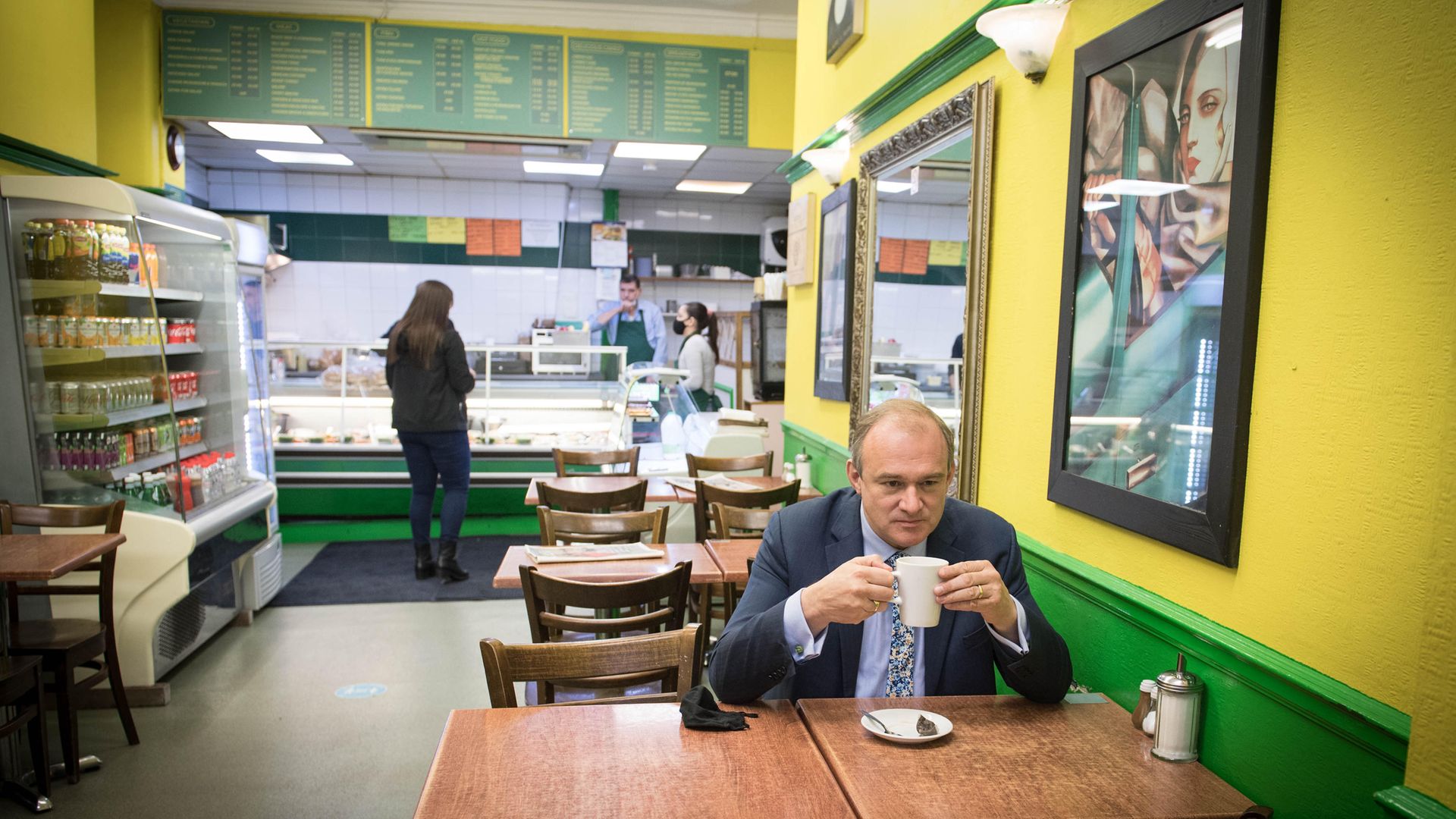
The pandemic might finally be giving the party a purpose, but it will also highlight the tensions of its dual heritage of economic liberalism and social democracy
For the first time since the last election the Liberal Democrats are getting some national attention. In his unqualified opposition to vaccine passports and some of the other pandemic constraints their newish leader, Ed Davey, has acquired a cause.
Recently Davey has been a regular interviewee on current affairs programme putting his ‘liberal’ case for opposing vaccine passports. As a bonus the right wing Spectator magazine paid him the ultimate compliment last month by mischievously describing him as leading the “new opposition”.
In spite of this sudden attention the Liberal Democrats are in a near fatal place. With only 11 MPs in a parliament where the government has a big majority they can make little or no practical difference to the legislation that changes our lives.
They are not even the third party in the House of Commons. The SNP secures far greater prominence with its leader at Westminster, Ian Blackford, guaranteed two questions a week at Prime Minister’s Questions. Unsurprisingly the media focus is on Boris Johnson and his government, the Labour party and the SNP. For many varied reasons they all remain gripping in their historic significance.
For a smaller UK political party to breathe it needs to seem relevant. Political journalists make many misjudgements and often share fashionable assumptions that prove to be wrong. But most of them are extremely smart in assessing relevance. If they sense a party is irrelevant they will more or less ignore every utterance from the leader downwards. Why bother if the party has ceased to matter?
There are several questions raised by Davey’s positioning in relation to the pandemic. Is he content to be in alliance with right wing libertarians in the Conservative party? Should his view of ‘freedom’ prevail over the powerful alternative argument that vaccine passports are a means to opening up public events and are therefore an agent of liberation? Is he taking a risk when opinion polls suggest an overwhelming majority of voters support passports and other constraints?
These are all valid questions but none of them matter very much when a party has virtually disappeared from national view. Opposing some of the pandemic constraints gives Davey and his party a purpose.
They are helped by the tortured convolutions of Johnson and Keir Starmer. Johnson is a libertarian by instinct to the point of recklessness but he wants to open up the economy and recognises that passports might play a part. He makes his case with imprecise hesitancy. Starmer argues with a clunky evasiveness that vaccine passports are “not British”, but his opposition is qualified. Davey has space to be noticed.
The same applies to Brexit. Again in too transparent a clunky manner Starmer has opted for near silence as the calamitous consequences of Brexit are being played out. While he persists with his unsubtle strategy the openly pro-European Lib Dems have spare terrain in which to highlight the disasters that follow from Johnson’s decision to opt for his hard Brexit.
Coherent distinctiveness has given the Lib Dems purpose at key moments in the party’s erratic past. When Labour won a second landslide in 2001 they could have struggled with relevance. Their opposition to the war in Iraq gave them a voice.
In the early 1980s the old Liberal party formed an alliance with the new SDP and made a strong social democratic pitch at a point when the two bigger parties were moving to the right and left.
In the 1990s as Labour became fearful of making any spending commitments it was Paddy Ashdown’s Lib Dems who put the case for higher public spending to be funded partly by a rise in income tax. The various causes were energising for a party with so few levers to pull on the national stage.
It is not without coincidence that these examples arise when Liberal or Liberal Democrat leaders connect with one of the party’s two conflicting historic paths. Steel, Ashdown and Kennedy were overtly on the left of centre. Steel and Kennedy were passionate critics of the coalition formed after the 2010 election. Originally Ashdown had urged Clegg to seek a deal with Labour.
The consequences of what happened in 2010 continue to haunt the Lib Dems. A party that pitched to the left of Labour in the election became part of a coalition with Conservatives shaped by a deepening euroscepticism and espousing economic policies to the right of Margaret Thatcher. Unsurprisingly the party was slaughtered at the subsequent 2015 election.
Normally brutal electoral defeats trigger intense post mortems that are fiercely contested internally. After a time there is some form of catharsis and a party experiences a significant renewal. This is what happened slowly with Labour after 1983 and more speedily but superficially with the Conservatives after 2005.
There has not been the same level of introspection in the Lib Dems, or if there has been few have noticed.
Some of Nick Clegg’s allies described him as a ‘Gladstonian liberal’ but the glamorous association with the giant of 19th century liberalism can lead to awkward imprecision in a modern setting. Gladstone’s hero was Robert Peel, the Tory leader who split his party over support free trade against protectionism.
The Lib Dems remain united now in their support for free trade and their robust opposition to Brexit makes sense in this historic context. But Gladstone did not lead in an era of vast public services that require state funding or when a Tory prime minister claims to be a big spending ‘Rooseveltian’ in a way that makes Gladstone’s more substantial Tory opponent, Disraeli, seem miserly.
Current political orthodoxies are far removed from the economic liberalism that seemed to unite leading Conservatives and Lib Dems in 2010. It is also miles away from Gladstone’s ‘sound money’ liberalism from a different age.
While paying sincere homage to the epic Gladstone the likes of Kennedy, Steel and Ashdown followed a different historic path in terms of economic policy. They hailed Lloyd George, a supporter of a fiscal stimulus in the late 1920s and early 1930s that placed him well to the left of Labour’s Ramsay Macdonald, Beveridge with his welfare revolution and Roy Jenkins, the SDP’s first leader who noted towards the end of his life that the problem with the UK is that it “wants European levels of public services and US levels of taxation”. Jenkins was a social democrat and, although a fiscally prudent chancellor in the late 1960s, was never a pure economic liberal.
So which is it to be for the Lib Dems now they are almost breathing again? The nearest parallel is Ashdown’s sparkling leadership after the 1992 election. The circumstances for the party were more propitious compared with now.
The Lib Dems had 20 MPs and John Major’s government had only a small majority. As a result their small parliamentary party carried more weight. Even so they risked oblivion not least with the rise of Tony Blair who might have smothered them.
Instead Ashdown worked closely with Blair, using a conference speech to end the party’s traditional position of ‘equidistance’ between the two bigger rivals. In 1997 the Lib Dems gained a further 28 seats.
As Davey and others have made clear the Lib Dems could not work with the current Conservative party, closer to the old Brexit Party than one nation Toryism. That’s the easy bit. The much harder part is to decide which of the two historic paths to take in relation to the economy. All parties are broad churches but the divide between economic liberals and social democrats is deep. This is not a division that is easily blurred. As part of the route ahead perhaps an even more candid and intense reckoning with the party’s recent past might help it move towards a more fruitful future.
Steve Richards’ latest book is The Prime Ministers-Reflections on Leadership from Wilson to Johnson
What do you think? Have your say on this and more by emailing letters@theneweuropean.co.uk










